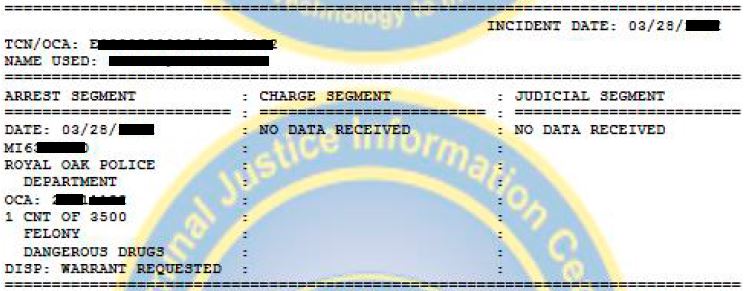Destruction of Arrest Record
You may be eligible to have a court order for the expungement or destruction of your arrest record if the prosecutor or the court dismisses your case before trial.

How to Have Your Arrest Record Destroyed
It should go without saying that your arrest record should be removed or destroyed when charges are dismissed. In some cases, the police/prosecutor may decide not to charge you after an on-scene arrest, but what happens to your arrest record? Unfortunately, arrest records in cases never filed in court or where the charges were dismissed before trial often remain on your criminal history, accessible to employers, credit agencies, and even TSA. Seeking the destruction of an arrest record might be vital to protecting your employability and reputation.
What are the possible consequences of having an arrest record in Michigan?
Although it is illegal in Michigan for an employer to ask applicants about misdemeanor arrests not resulting in a conviction, many employers routinely circumvent this prohibition and search for applicant arrest records throughout the hiring process. Because hiring decisions are rarely explained, proving that this discrimination occurred is often difficult or impossible. This is a huge problem that does not stop with prospective employers. Arrests not resulting in a conviction can cause problems for students, professionals, parents in divorce proceedings, and many others who are unfortunately forced to relitigate their innocence even after their case is dismissed. An arrest record can cause havoc if allowed to remain on your record.

What can I do to get my criminal history expunged or destroyed?
Fortunately, in Michigan, anyone can request the destruction of their arrest record, including biometric data (i.e., any computer data created during a biometric process), a record of fingerprints, and DNA when the charge is dismissed before trial. The Michigan State Police are only required by law to destroy such an arrest record when they receive an “appropriate order” issued by the district or circuit court that dismissed the case. Because it takes specialized knowledge to obtain a court order, it is essential to contact an experienced criminal defense attorney to help you seek the destruction of your arrest record.
Obtaining such an “appropriate order” is no small task and is not accomplished by simply calling the prosecutor and the court. Instead, a motion and accompanying brief must be submitted to the court and served on the local prosecutor. These legal pleadings must follow all applicable state court rules and local rules of each court. It is equally important that these legal pleadings accurately, credibly, and persuasively detail your situation. Your lawyer must draft the pleadings correctly because a court is unlikely to hear a second or subsequent motion should your first request be denied. Discussing such a motion with the local prosecutor before filing it with the court is also essential. A prosecutor may object to destroying your arrest record within 60 days after your case is dismissed. Therefore, it is essential to retain experienced and knowledgeable counsel to guide you through this process when seeking the destruction of your arrest record.
An Example of a Criminal Record With No Conviction
Below is an example of a client of LEWIS & DICKSTEIN, P.L.L.C., who came to us with a criminal history, even though, years ago, the prosecution dismissed their felony charge in a plea bargain to a civil infraction. The client is a registered nurse (RN) seeking work in Southeastern Michigan. A background check turned up the arrest, which should have been removed. Our team went to work immediately to force the Michigan State Police to clear the criminal history immediately. Now that her record is squeaky clean, she can look for a position as a medical professional without fear that her old charge will come back to haunt her again. Mission accomplished!
An Expungement Can Clear Your Criminal History
Recently, the Michigan Supreme Court issued a Memorandum directing all district and circuit court judges that each judge has judicial discretion to determine what it means for a charge to be “dismissed before trial.” In other words, each judge has judicial discretion to determine what type of disposition qualifies as a “dismissal before trial.” For example, a judge may grant a request to destroy an arrest record for an individual who pled guilty or no contest to a charge if they’ve completed all required terms of their delayed sentence or deferred judgment of guilt. However, once an arrest record is permanently destroyed, neither courts nor prosecutors have any record of arrest or biometric data to consider when evaluating future discretionary decisions involving the same individual. Consequently, when considering a motion to destroy an arrest record in such a scenario, a judge must consider whether the arrest record sought to be destroyed may prove helpful to a prosecutor or court in the future.
Each judge has the discretion to grant or deny such a motion, and each court has different local policies and rules concerning the destruction of arrest records. This is why it is of the utmost importance that you contact a dedicated criminal defense attorney before attempting to persuade the court to order the destruction of your arrest record on your own. If you have had a matter dismissed or dismissed under a delayed sentence or deferred judgment of guilty, your arrest record may still prevent you from enjoying the full benefits of such a dismissal.

Attorneys Winning Motions to Eliminate Arrest Records
To get your arrest record destroyed as soon as possible and avoid further negative consequences of your arrest, call LEWIS & DICKSTEIN, P.L.L.C. for a free consultation and confidential case evaluation. An experienced criminal defense attorney will talk with you, answer your questions, and address your concerns. When there is no room for errors and false promises, the attorneys with LEWIS & DICKSTEIN, P.L.L.C. will not let you down!
Call us today at (248) 263-6800 for a free consultation or complete an online Request for Assistance Form. We will contact you promptly and find a way to help you.














